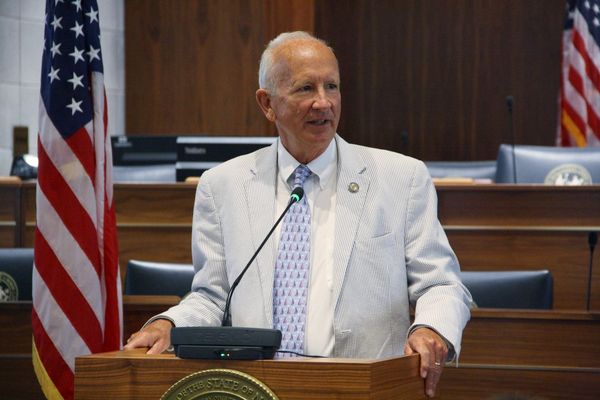
We don’t often get to hear from the victims of political expediency, but this week we did, in spades, from a former senior bureaucrat who was done over and left for dead as John Barilaro pursued what he considered his: a fabulous, $500,000-a-year gig in New York, paid by the taxpayer.
This particular example played out in NSW. But the story of Jenny West, who was barrelled aside to sate the desires of the former NSW deputy premier, is the story of anyone — public servant or otherwise — who ever believed in a fair process only for that belief to be shattered by the degraded behaviour of the political class.
We witnessed it by the bucket load under the previous Coalition government, which turned the Administrative Appeals Tribunal (AAT) into a frat house for Liberal Party cronies all supported on the public dime.
For every job gifted to a political mate, there are good people who suffer. In the case of the AAT, highly credentialled professionals saw their careers terminated simply because a space was needed for a political friend. Then there are those dedicated souls, fired by the desire to perform public service, who put their hat in the ring for an AAT role in the quaint belief, fostered by the government itself, that their application would be assessed on merit.
Crikey has spoken to these people in the past, nearly always off the record. They are rueful and disillusioned by how brutally they have been treated. But rarely if ever will they speak about it. Why? Because it is degrading and humiliating. They fear reprisals. Speaking up also casts people as whingers. And who would ever employ a whinger?
The term “moral injury” is normally applied to military contexts, but it works in these contexts too. It captures the core of the hurt: you believed in the system, but it betrayed you and your mission.
The term might have been invented for Jenny West, the one-time deputy secretary of Investment NSW. She specialised in global trade and thought she might have a crack at a trade job in New York. Here’s how the events have unfolded, as revealed in hearings of an upper house inquiry into how John Barilaro ended up with the job salaried at half a million dollars.
In April 2021, Investment NSW advertised the job. Interviews were conducted in July, following an independent process. In August, Jenny West was told she was the preferred candidate. Her boss, Amy Brown, congratulated her and sent her a signed note from then-premier Gladys Berejiklian. Contract terms were quickly agreed. But then in September, Brown invites West for the dreaded “beach walk” where she imparts the news that the job might not be so certain after all. By October 1, it was all over, as was West’s career as a senior NSW public servant.
Three days later, Barilaro quit Parliament. Just more than three months later, he applied for and was ultimately selected for the New York post.
Like many who have been done over by self-interested politicians, West had resolved to keep the hurt to herself and to suck it up. She never wanted any of this to become public. No one likes a complainer. It’s an unspoken system that keeps political abuses of power going.
This week, however, West was forced into giving public evidence, thus becoming an unwilling whistleblower on the system. West spoke of her distress at the turn of events. She was “extremely upset” at having the job taken away from her. She was “trying to move on” from a “disappointing episode”.
She also used a revealing phrase to describe the chain of events that saw her stripped of a role that was rightly hers. “I couldn’t get my head around how a process could be stopped midway and then to be told that I’d lost my existing job. To be honest, I couldn’t get my head around that,” she told the upper house inquiry.
Then there was her fear for the future.
“I’ve worked exceptionally hard for my career over the years and I’m a very professional person that works because I enjoy it,” she said. “I love working with people. I love building great teams. So I was quite horrified by what [her boss, Amy Brown] said, because it is so different from who I am.”
“And I would hope, in the future, an organisation will take me for who I am and see the truth,” she added.
Crikey contacted two people interviewed for the job originally set for Jenny West, seeking their views on the process that had delivered Barilaro his plum job. One, Peter Hendy, is a former Liberal politician. The other, Rob Fitzpatrick, is a director of the Meat and Livestock Association (MLA). Hendy said he had no comment. We have not heard back from Fitzpatrick, who we tried to contact through the MLA. But really, who would blame them?
Jenny West found herself ultimately friendless in the bureaucracy. Having warmly endorsed her, Amy Brown later found reasons to doubt her former trusted colleague as the political winds shifted. Attempting to raise the alarm on the process, West also contacted her “one-up” boss, the head of the Department of Premier and Cabinet, Michael Coutts-Trotter, but to no avail.
Ultimately West was bundled out of the public service altogether under a “no cause” termination and given a statutory 38-week payout — a handy sum, no doubt, but does it balance out the betrayal?
It has been reported that the NSW ICAC is now looking into the Barilaro saga. Is it a case of corruption? Maybe it is. Maybe it isn’t.
It is though, unquestionably, indecent. As yet there has been no apology from Premier Dominic Perrottet. But then again, there has never been any contrition from federal Coalition politicians either, for the careers and hopes of good people that were destroyed on an enormous scale when the former government stacked boards and tribunals with political cronies.
Jenny West’s story sheds light on one of the hidden costs of a politically corrupted process — and it should be widely heeded.







